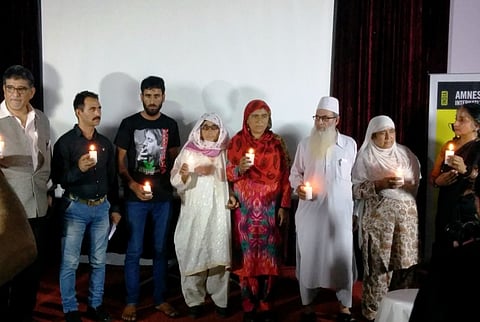

Amidst charges of sedition and protests by ABVP members, Amnesty International India on Tuesday responded to the allegations made against the Kashmir event organized in Bengaluru on August 13.
Rebutting the allegations, Amnesty said that they were “without substance”. It said that the allegations were preventing the families who had suffered human rights violations in Jammy & Kashmir from having their voices heard as well as civil society organisations “from enabling these families to exercise their constitutional right to justice.”
Amnesty also clarified that the ‘Broken Families’ campaign was based on a report published in July 2015 after thorough research in Jammu & Kashmir, which documents the hurdles to justice faced by the families featured.
Reproduced here, is Amnesty's rebuttal to the complaint.
1) “Sindhujaa Iyengar, a political science lecturer at a private university in Bengaluru, Seema Mustafa and Roushan Illahi sang anti-national songs and raised anti-national slogans.”
Sindhujaa Iyengar is an employee of Amnesty International India. She was not present on stage at any point during the event. Seema Mustafa is a senior journalist. She moderated a discussion with affected families at the event. Neither of them sang any songs or raised any slogans at any point.
The only musical performance was a song by Roushan Illahi (also known as MC Kash) at the end of the event, about growing up amid violence in Kashmir.
Video footage of the event which was recorded by Amnesty International India has been shared with the police.
2) “Sindhujaa Iyengar, Seema Mustafa and Roushan Illahi…delivered anti-national speeches against soldiers.”
The only speech delivered at the event was by Amnesty International India’s Programmes Director, Tara Rao, which referred to allegations of human rights violations by security force personnel. These allegations are laid out in detail in Amnesty International India’s 2015 report, and have been widely reported and discussed. The People’s Democratic Party (PDP), which is part of the current ruling coalition in Jammu and Kashmir, had welcomed the recommendations of the report when it was published.
The families who attended the event spoke of their own personal stories of loss, as per the programme of the event. One of the families who attended the event was that of Shahzad Ahmad Khan, one of the men killed in the Machil extra-judicial execution, for which five security force personnel were convicted and sentenced to life imprisonment.
Amnesty International India also invited R.K. Mattoo, a representative of the Kashmiri Pandit community in Bengaluru to speak about the human rights violations faced by members of the community.
3) “Slogans were raised that Indian Kashmir should be part of Pakistan.”
No Amnesty International India employee shouted any slogans at any point.
4) “The event indirectly supported terrorists.”
The only discussion at the event was about allegations of human rights violations and the denial of justice to families in Kashmir. These are issues that have regularly been discussed in the media. They have been written about at length by members of Parliament, politicians, judges and civil society. In July 2016, the Supreme Court, in a ruling relevant to the issues discussed at the event, stated that the armed forces do not enjoy impunity for human rights violations.
5) “The event…indirectly supported Pakistan and the ISI.”
The focus of the event was squarely on allegations of human rights violations and the denial of justice in Jammu and Kashmir. Amnesty International has worked extensively on human rights violations in Pakistan, including the enforced disappearances and unlawful killings of political activists in Balochistan, violations by security forces in the Federally Administered Tribal Areas (FATA), and violence against journalists by groups including the ISI.
6) “When ABVP activists tried stopping the attack, people tried to assault them.”
No Amnesty International India employee was involved in any form of assault against anyone.
Towards the end of the event, some of those who attended raised slogans, some of which referred to calls for ‘Azaadi’ (freedom). Amnesty International India as a matter of policy does not take any position in favour of or against demands for self-determination. However, Amnesty International India considers that the right to freedom of expression includes the right to peacefully advocate political solutions
Amnesty International India had invited the Bengaluru police to be present at the event, in the interest of the security of the invited families and other attendees. We have shared our footage of the event with the police.
The Supreme Court of India has ruled on multiple occasions, notably in the case of Kedar Nath Singh versus State of Bihar, that speech would amount to sedition only if it involved incitement to violence or public disorder. The court ruled: "[C]riticism of public measures or comment on Government action, however strongly worded, would be within reasonable limits and would be consistent with the fundamental right of freedom of speech and expression.”
In the case of Shreya Singhal versus Union of India, the Supreme Court ruled: “‘Mere discussion or even advocacy of a particular cause howsoever unpopular is at the heart of [the right to freedom of expression].” It stated that the right could be restricted “only when such discussion or advocacy reaches the level of incitement”.